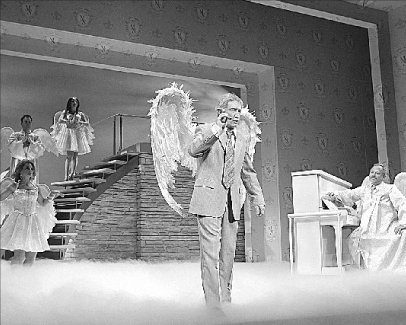The completely mental misadventures of Martin Short
I have to admit, I went to see “Martin Short: Fame Becomes Me” gleefully anticipating the kind of theatrical schadenfreude that often goes along with the one-time TV-star’s one-person show. I had even tried to work up some barbs that might be funny in advance to pepper what I anticipated would be a salty review—without the aid of alcoholic consumption, no matter what my detractors might suppose.
Of course the irony of the world is such that my hubris and not the entertainer’s got its comeuppance. I might have given this show short shrift, but “Fame Becomes Me” is a delightful, diverting and mostly hilarious kind of variety show that make a nice treat in a steady diet of theatergoing—and a wonderful risk-free night out with a consummate showman completely in charge of the stage and the material. It’s easy to forget from Short’s prominence on TV that he was first a Broadway performer, and the show, which is a semi-fictional autobiographical tell-all in the vein of “Little Me,” a former Short vehicle, shows that he still has the stage chops. His timing is impeccable. His singing has enough character to be right for the numbers, and he’s had the good sense to surround himself with an insanely talented company. All in all, I found myself completely surrendered and enchanted. Funny how that works.
The musical is a series of skits that allow Short to show off what he does best, wacky characters and over-the-top scenarios with a kind of Borscht Belt comedy that includes jokes about women’s anatomy, 12-step recovering, a show-biz vision of heaven, and a terrible childhood—everything, in fact, that is de rigeur in the life of the contemporary celebrity. It’s not the kind of thing I would normally go for, quite frankly, but in the years since we’ve seen Short, he’s refined his shtick so it’s smoother, wittier, and has one huge component often missing in his previous work—heart. Of course, none of this is easy to pull off, but Short doesn’t seem to be working so hard, the comedy feels more natural and fluid, and even such stock comic devices as sexually precocious infants takes on new levels of satire. It’s intelligent, innocent fun that shamelessly seeks to entertain the audience, neither pandering nor pushing too hard, and as a result revitalizes this once-tired entertainment form.
Marc Shaiman has written a delightful score for the musical, and Shaiman himself appears on stage. He’s a loveable, warm presence whose wit sparkles and who appears grounded compared to Short—quite literally at one point—which is a smart device for developing the satire.
The four-person ensemble, as noted above, is terrific, working their hearts out in a variety of different roles. Brooks Ashmanskas delivers, as always, singing and dancing, always with great timing. Mary Birdsong is superb, particularly in a number in which she does a scary interpretation of Judy Garland in “The Wizard of Oz,” and Nicole Parker is hilarious in her various roles. Capathia Jenkins is delicious throughout, but she stops the show with a number that’s pure Marc Shaiman about a big black woman stopping the show.
I walked away marveling at the skill of everyone involved and the unique ability to take a staid form and make it work on its own merits and as satire. The level of intelligence applied to what would normally just seem slapdash, crowd-pleasing entertainment is remarkable. Short may have titled his show with his tongue firmly in his cheek, but this smart generous and genuinely funny and evening proves that Broadway certainly becomes him.
gaycitynews.com


































